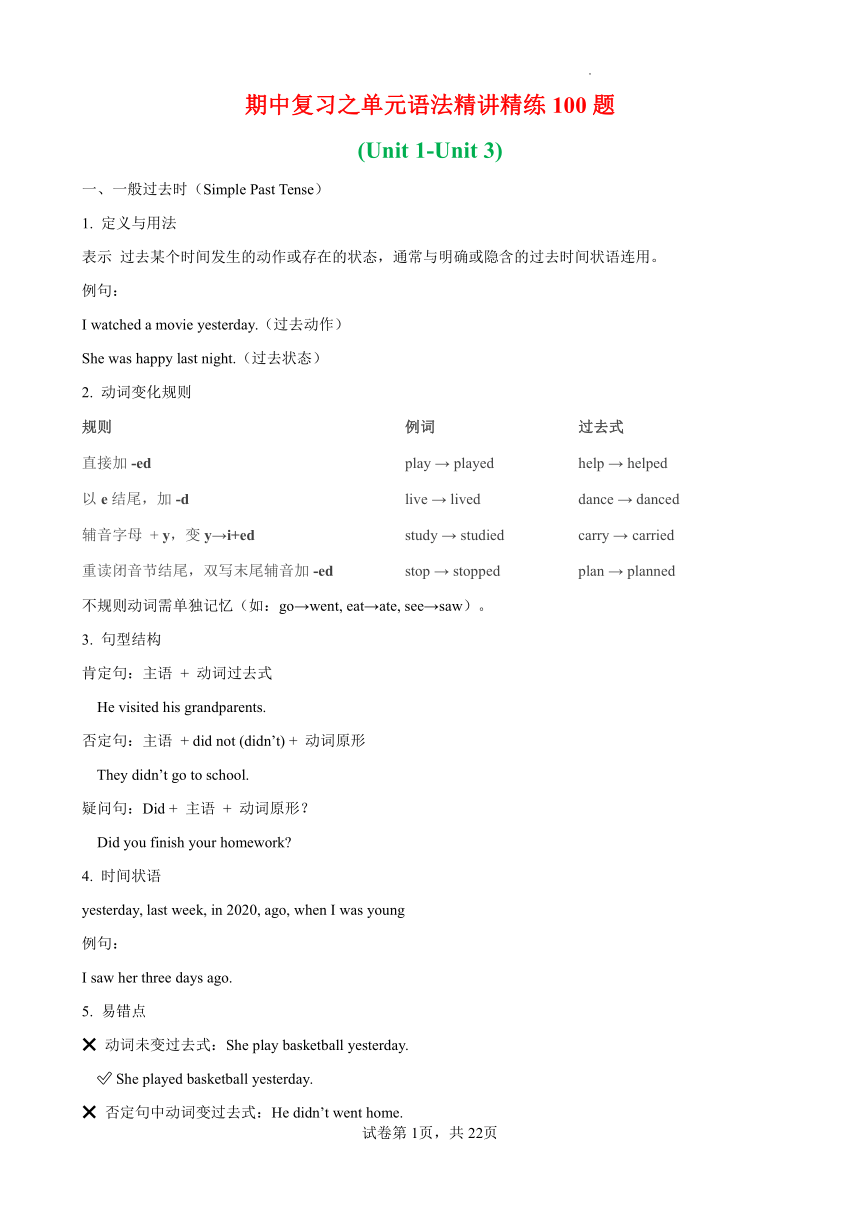
期中复习之单元语法精讲精练100题 (Unit 1-Unit 3) 一、一般过去时(Simple Past Tense) 1. 定义与用法 表示 过去某个时间发生的动作或存在的状态,通常与明确或隐含的过去时间状语连用。 例句: I watched a movie yesterday.(过去动作) She was happy last night.(过去状态) 2. 动词变化规则 规则 例词 过去式 直接加 -ed play → played help → helped 以 e 结尾,加 -d live → lived dance → danced 辅音字母 + y,变 y→i+ed study → studied carry → carried 重读闭音节结尾,双写末尾辅音加 -ed stop → stopped plan → planned 不规则动词需单独记忆(如:go→went, eat→ate, see→saw)。 3. 句型结构 肯定句:主语 + 动词过去式 He visited his grandparents. 否定句:主语 + did not (didn’t) + 动词原形 They didn’t go to school. 疑问句:Did + 主语 + 动词原形? Did you finish your homework 4. 时间状语 yesterday, last week, in 2020, ago, when I was young 例句: I saw her three days ago. 5. 易错点 动词未变过去式:She play basketball yesterday. She played basketball yesterday. 否定句中动词变过去式:He didn’t went home. He didn’t go home. 二、不定代词(Indefinite Pronouns) 英语中的不定代词有很多,用法也比较灵活,这里只介绍常用的几个。 (1) neither和none neither和none都表示否定的意思,它们的区别在于:neither表示对两者的否定,而none用于表示对三者及以上的否定。例如: I saw two boys at the door, but neither (of them) is my brother.我看到门口有两个男孩,但他们都不是我哥哥。 None (of the students) in my class wants / want to give up.我们班没有学生想放弃。 另外,none除指可数的人和物外,还可以表示不可数的东西。none还可以表示“零”这一数字概念。例如: I thought there was some coffee in my office, but there's none there.我以为办公室里有些咖啡,可一点都没有。 -How many postcards have you sent 你寄出了多少张明信片 -None.一张都没寄。 (2) both和all both表示“两者”,而all表示“全体,一切”,指三者及以上。all还可以指不可数的事物。例如: -Which of the two shirts do you like 这两件衬衫你喜欢哪件 -I like both.两件都喜欢。 All of the students went to the cinema yesterday evening.昨晚所有的学生都去电影院看电影了。 All was changed.一切都被改变了。 both和all还可以用于主语之后。例如: We both / all passed the exam.我们俩/大家都通过了考试。 (3) either 肯定句中表示“两者之一”,否定句中表示“两者都……”。 - 代词:You can take either of these books.(你可以拿这两本书中的任何一本。) - 副词:I don't like either of these books.(这两本书我都不喜欢。) - 连词:You can take either this book or that one.(你可以拿这本书或者那本书。) 三、系动词(Linking Verbs) 1. 定义与功能 系动词本身无完整意义,用于连接主语和表语(形容词/名词),说明主语的性质、状态或身份。 常见系动词: be(am/is/are/was/were) 感官动词:look(看起来), sound(听起来), smell(闻起来), taste(尝起来), feel(感觉) 状态变化动词:become(变得), get(变得), turn(变成), grow(逐渐变得) 保持状态动词:keep(保持), stay(保持), remain(仍然) 2. 用法与例句 be + 名词/形容词: She is a teacher.(身份) The cake tastes sweet.(性质) 感官动词 + 形容词: The music sounds beautifully. The music sounds beautiful. 状态变化动词 + 形容词/名词: He became ... ...
~~ 您好,已阅读到文档的结尾了 ~~